Key takeaways
- Virtue ethics emphasizes developing good character traits like courage, honesty, and kindness, focusing on personal growth rather than mere compliance with rules.
- The concept of the “Golden Mean” highlights the importance of balance in virtues, illustrating that extremes can be harmful.
- Setting specific personal ethical goals transforms abstract virtues into daily challenges, facilitating continual self-improvement.
- Reflective journaling and learning from role models are practical steps to consciously cultivate virtues in everyday life.
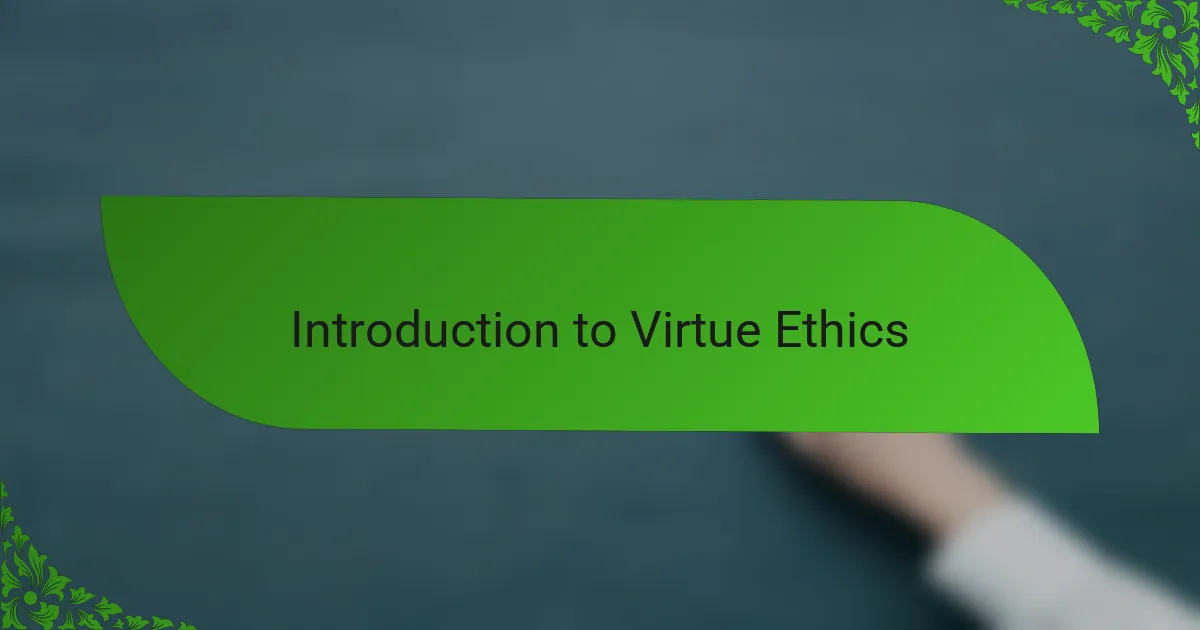
Introduction to Virtue Ethics
Virtue ethics, rooted in Aristotle’s philosophy, focuses on developing good character traits rather than merely following rules or calculating outcomes. When I first encountered this approach, it struck me as deeply personal—an invitation to become the kind of person I aspire to be, rather than just doing what seems right in isolated moments.
Have you ever wondered what it truly means to live a good life? For me, virtue ethics provided a fresh perspective by emphasizing habits and virtues like courage, honesty, and kindness as the foundation of moral living. It’s less about ticking boxes and more about shaping the inner self.
This focus on character feels both challenging and rewarding. It asks us to reflect continuously and grow, which can be uncomfortable but also profoundly fulfilling. In my experience, adopting virtue ethics turned ethical questions into opportunities for self-improvement rather than dilemmas to avoid.
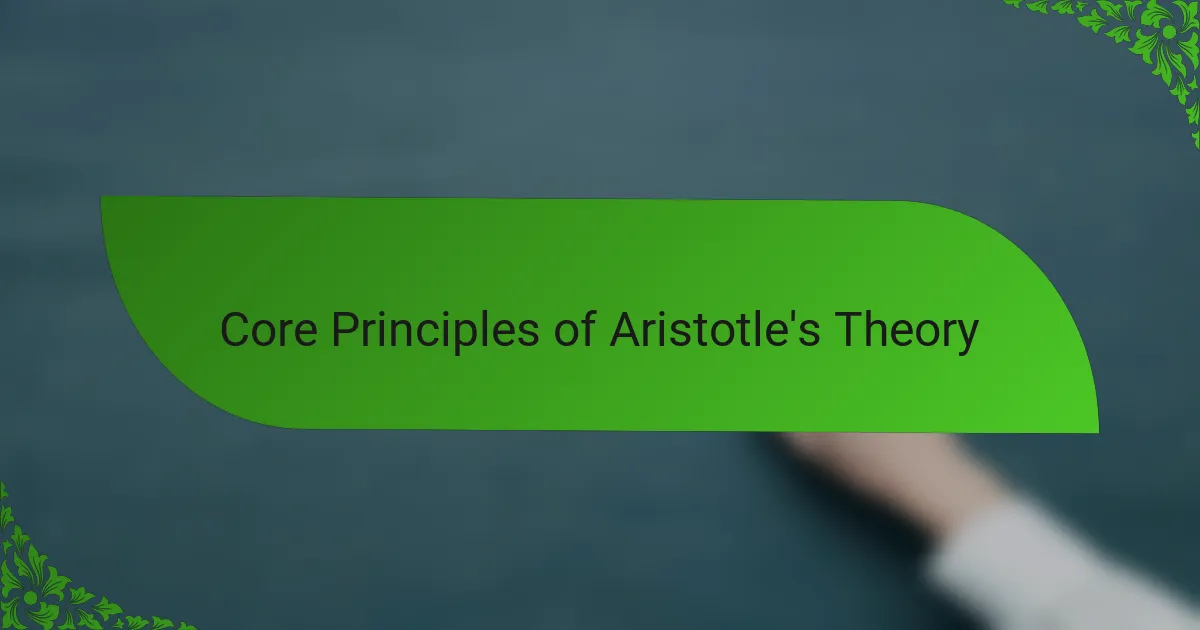
Core Principles of Aristotle’s Theory
At the heart of Aristotle’s virtue ethics lies the idea that living well means cultivating virtues—qualities like courage, temperance, and justice—that guide our actions naturally. I remember realizing that these virtues aren’t just abstract ideals; they are habits formed through practice, something I had to nurture daily. Have you ever noticed how some people seem effortlessly kind or honest? That’s because these traits have become second nature, a product of repeated choices.
Another core principle Aristotle emphasizes is the concept of the “Golden Mean.” This idea suggests that virtue lies between two extremes—too much or too little of a trait can be harmful. For example, courage is the balance between recklessness and cowardice. Personally, understanding this made me rethink my reactions: maybe being too cautious was holding me back just as much as rushing in blindly. It’s a balancing act, and it requires constant self-awareness.
Finally, Aristotle believed that the ultimate goal of virtue is eudaimonia, often translated as “flourishing” or “human flourishing.” This isn’t just about feeling happy moment-to-moment but about living a fulfilled, meaningful life over time. When I first grasped this, it shifted how I viewed my decisions—not just what felt good now, but what contributed to my growth as a whole person. Isn’t that a powerful way to approach ethics? It feels more hopeful and personal to me.
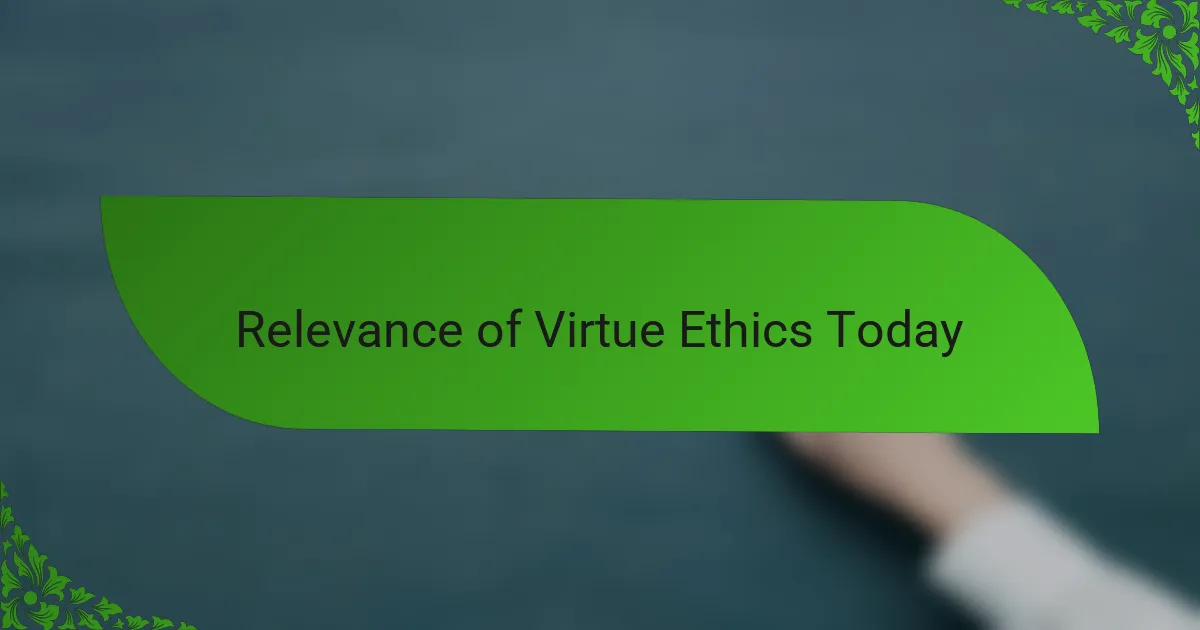
Relevance of Virtue Ethics Today
Isn’t it intriguing how Aristotle’s virtue ethics remains so relevant in our fast-paced, outcome-driven world? I often find that focusing on character development offers a refreshing contrast to the impulse for quick fixes or rigid rules. It’s as if cultivating virtues gives me a steady compass amid the chaos of modern life.
Sometimes, I think about how virtues like honesty or patience can transform everyday interactions. Have you noticed how these qualities build trust and connection in ways rules alone never could? That personal growth aspect of virtue ethics makes it feel less like a moral checklist and more like an ongoing journey—one that’s deeply human and relatable.
In my experience, applying virtue ethics today encourages reflection beyond mere compliance. It asks, “Who do I want to be?” rather than “What must I do?” This subtle shift has made ethical challenges feel more meaningful, pushing me toward genuine improvement instead of simply avoiding mistakes. Don’t you find that kind of self-directed growth both challenging and rewarding?
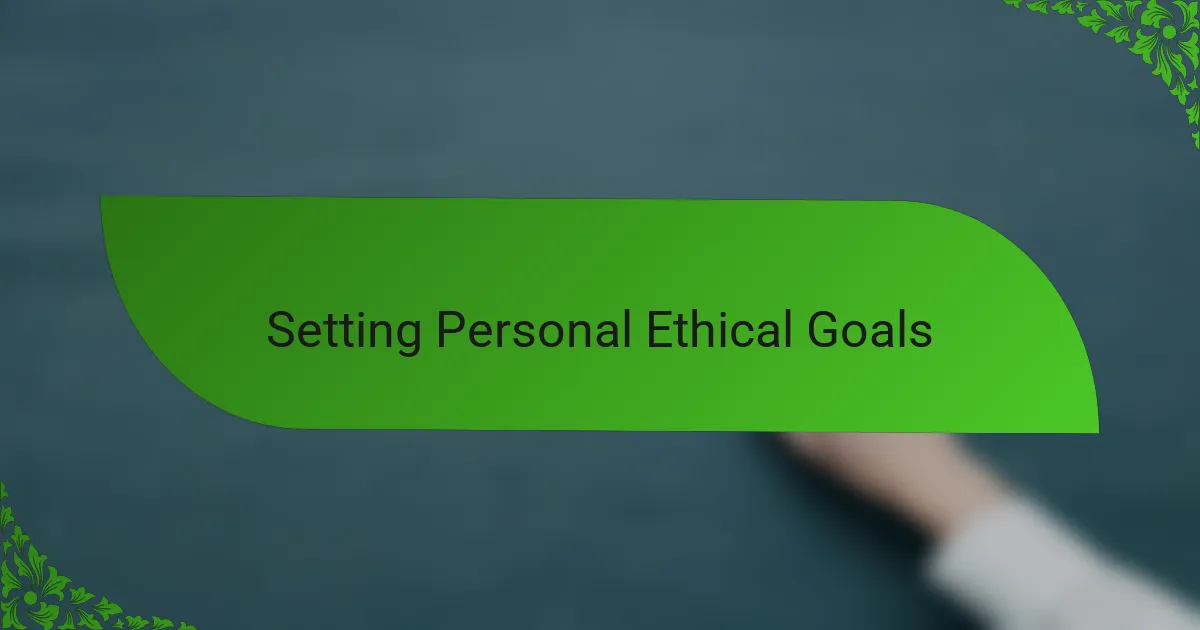
Setting Personal Ethical Goals
Setting personal ethical goals felt like steering my own ship for the first time. I asked myself, “Which virtues do I genuinely want to embody?” For me, honesty and patience became starting points, not because they were perfect, but because I saw areas where I often stumbled.
There was a moment when I realized vague intentions weren’t enough. Clear, specific goals—like speaking truthfully even when it’s uncomfortable—gave me a concrete way to practice virtue daily. It transformed ethics from abstract ideas into real challenges I could meet, little by little.
Have you ever set personal goals that felt both inspiring and daunting? I found that breaking down virtues into achievable steps made the journey feel less overwhelming and more rewarding. It’s a process of constant adjustment, but each small success builds the character I want to develop.
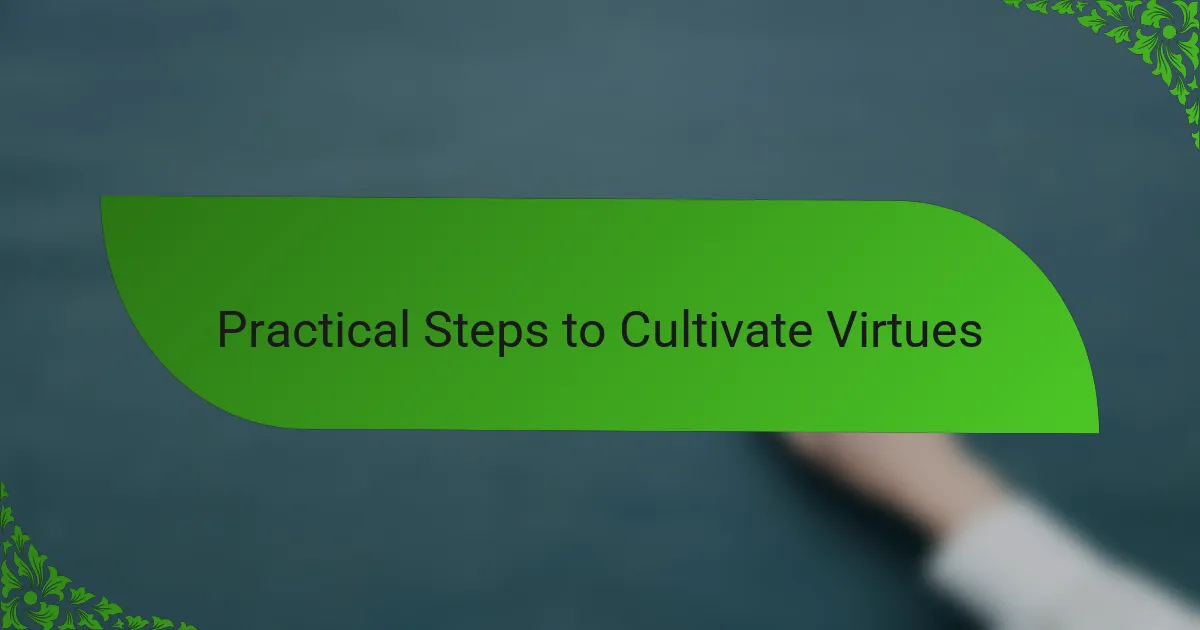
Practical Steps to Cultivate Virtues
One of the first practical steps I took was to identify specific situations where I could practice virtues deliberately. For instance, I made a conscious effort to show kindness in moments of impatience, like during long waits or frustrating conversations. Have you ever noticed how deliberately pausing before reacting changes not just the outcome, but also your sense of self? That pause became a small but powerful habit.
I also found that keeping a daily reflection journal helped me track my progress and setbacks honestly. Writing about when I lived up to my virtue goals or when I fell short made the abstract idea of virtue feel tangible and personal. It wasn’t always easy to admit mistakes, but looking back allowed me to adjust my approach thoughtfully rather than beating myself up.
Lastly, I sought out role models whose virtues I admired, not just famous philosophers but people in my everyday life. Observing how friends or colleagues embodied courage or generosity inspired me to emulate those traits in my own way. Isn’t it easier to grow when you have examples that feel real and relatable? This step grounded virtue ethics in community, reminding me that character development is both personal and social.
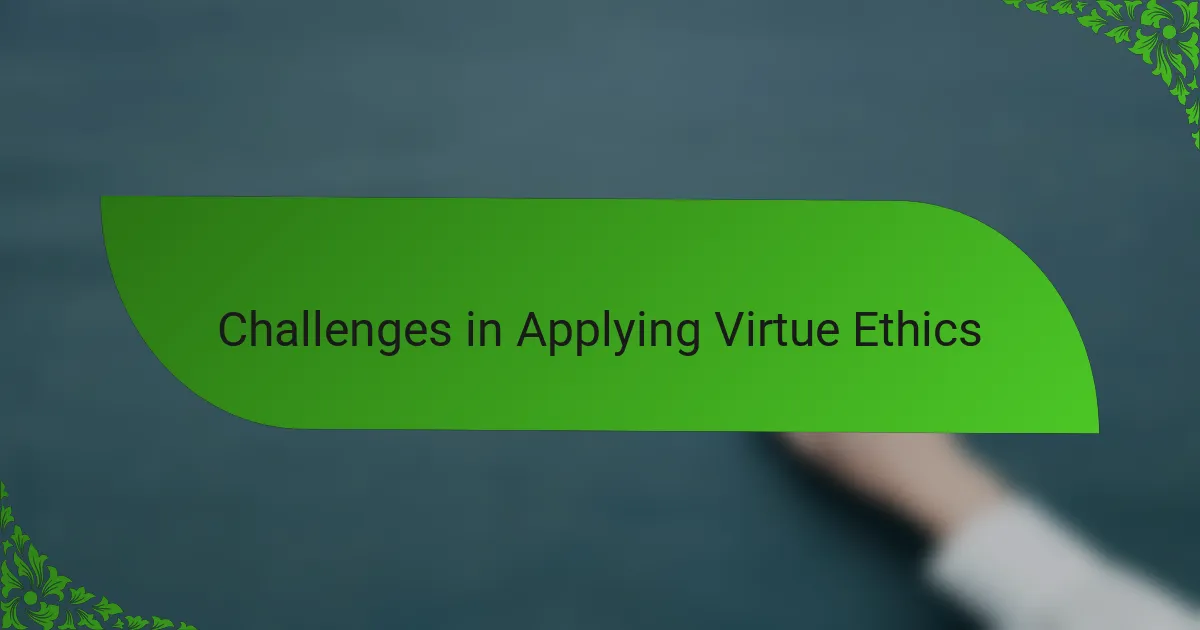
Challenges in Applying Virtue Ethics
Applying virtue ethics hasn’t been without its difficulties. I often found myself wrestling with uncertainty—how do I know if I’m truly acting virtuously or just rationalizing my behavior? This ambiguity differs so much from clear-cut rules, and at times, it felt like walking a tightrope without a safety net.
Another challenge I encountered was the tension between personal virtues and societal expectations. Have you ever felt that what you believe is virtuous doesn’t quite match what others expect? For me, balancing authenticity with social norms required a kind of moral courage that wasn’t always easy to summon.
Finally, the slow pace of character development tested my patience. Virtue ethics demands habitual practice over time, but I sometimes craved quicker results. Learning to embrace the gradual nature of growth—celebrating small wins while accepting setbacks—became essential. Have you noticed how meaningful progress often comes from persistence rather than speed? I certainly have.
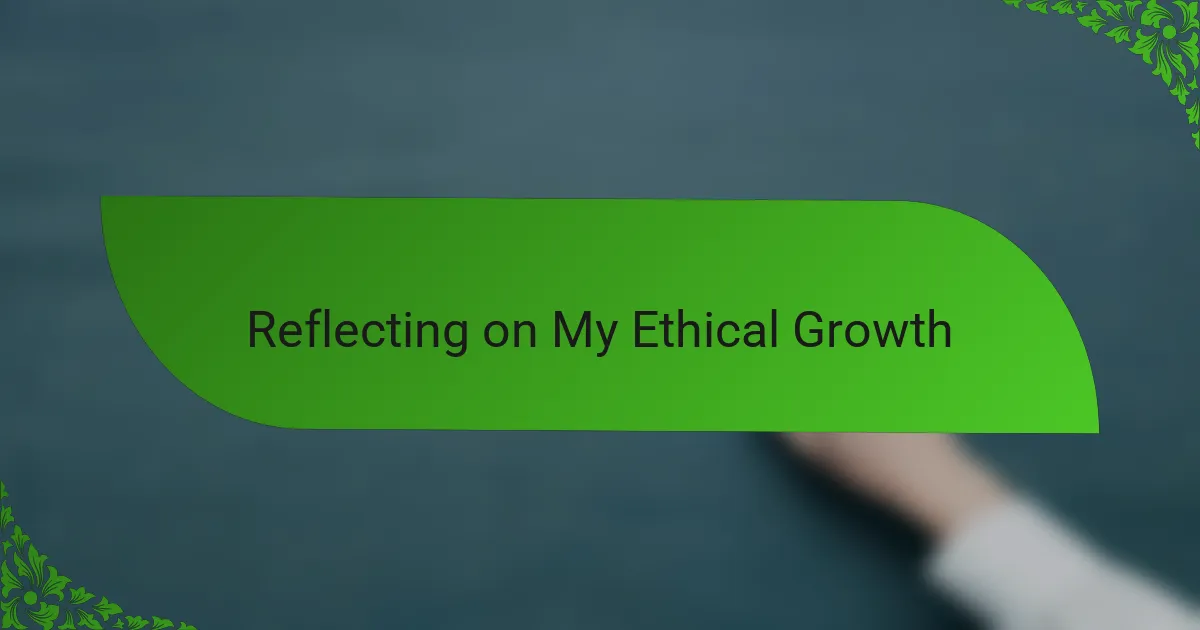
Reflecting on My Ethical Growth
Looking back on my journey, I realize how much my understanding of virtues has deepened beyond mere concepts. There were moments when I caught myself reacting habitually in ways that didn’t align with the person I want to become, and those became important turning points. Have you ever been surprised by your own behavior, prompting a pause for reflection? Those surprises, for me, marked real ethical growth.
I’ve also noticed that my ethical growth isn’t linear—it feels more like a winding path with steps forward and occasional slips. Sometimes, I get frustrated with slow progress, but then I remember Aristotle’s emphasis on ongoing practice. This mindset helped me be kinder to myself during setbacks, seeing them not as failures but as opportunities to learn more about my character.
Ultimately, reflecting on my development makes me ask: Am I becoming more patient, courageous, or honest today than I was yesterday? Answering that honestly has become a daily practice, reminding me that virtue ethics is less about perfection and more about continual growth. It’s a challenge, but one I find surprisingly motivating and deeply rewarding.